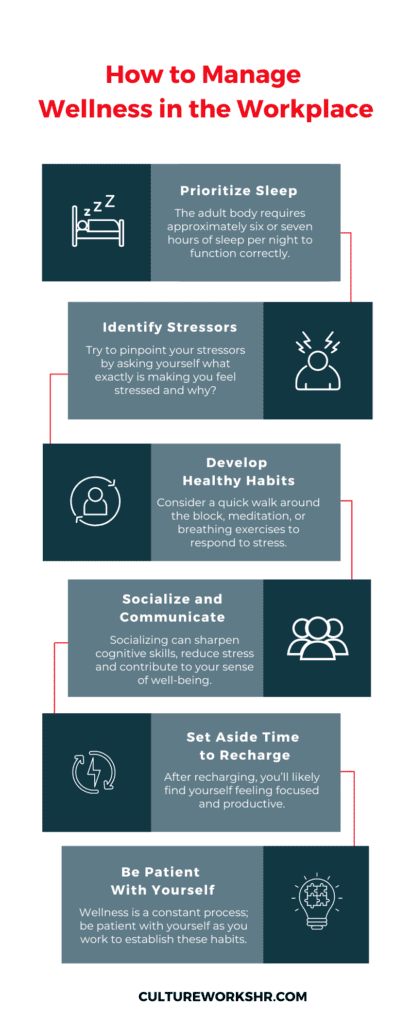How to Manage Wellness in the Workplace
How to Manage Time, Wellness, and Self: Part Two
To manage personal wellness, individuals need to make conscious efforts with the goal of improving physical, emotional, mental, and spiritual health.
While often associated with yoga classes, seminars, and green juice smoothies, personal wellness should be more a long-term, evolving process than a short-term, achievable goal. Although we admit, we do enjoy yoga, seminars, and green juice smoothies – Who says you can’t have both?
Wellness isn’t only significant at home or in the workplace. You should consider and adjust both aspects of your life in your journey toward personal wellness.
So, we’re here with the second part of our three-part series. Today, we’re discussing strategies to manage your personal well-being in the workplace.
What is Wellness in the Workplace?
Wellness in the workplace refers to the mental and physical health of employees in the company. Therefore, your efforts to improve wellness may include elements intended to support healthy behaviors as well as reduce risks to both mental and physical health. By addressing these risks and practicing healthy behaviors, you can improve your work life as well as prevent more serious health issues in the future.
How Do Companies Improve Employee Wellness?
Companies may take a number of approaches to improve employee wellness. For example:
- Wellness Activities
- Free Medical Screenings
- Health Coaching
- Health Club Memberships
- Stress Management Practices
- On-Site Fitness Programs or Facilities
- Accessible Kitchens or Healthy Food options
- Company Wellness Competitions
- Wellness Education: Programs, Courses, Online Resources
In addition to utilizing the wellness resources provided by your company, you can also implement several strategies to manage your own wellness in the workplace. Let’s dive in.
How to Manage Your Personal Wellness
For many people, wellness can be difficult to prioritize amongst packed schedules, demanding projects, and a busy personal life. However, investing in your personal well-being can help you build healthy habits to better navigate these obstacles.
Prioritize a Proper Sleep Schedule
According to Fort HealthCare Business Health, reducing your sleep by as little as an hour and a half for just one night could result in daytime alertness being reduced by as much as 32%. Further, reduced sleep can also impair your brain’s ability to process and store information as well as problem-solve.

The adult body requires approximately six or seven hours of sleep per night to function correctly. Prioritize sleep by first deciding what your schedule will be including a goal time to wake up and a goal time to go to sleep. Consider implementing strategies to help you keep this schedule, such as:
- Setting alarms to remind yourself to get ready for bed
- Designing a calming nighttime routine
- Turning off devices at a certain time
- Skipping naps (we know, we know! But naps can make it difficult to sleep at night and lead to drowsiness or grogginess, especially if the nap is after 3 pm.)
- Create a quiet and dark environment to sleep
Take Steps to Manage Your Stress
Work-related stress can cause you to feel unhappy with both your job and your personal life. The good news is that there are a few strategies you can use to manage your stress and improve your personal wellness.
Find Your Stressors
Try to pinpoint your stressors by asking yourself what exactly is making you feel stressed and why? You may choose to keep a journal to record your thoughts as well as information about stressful circumstances. This technique can help you to learn more about your specific stressors so you can better prepare for and respond to similar events in the future.
Develop Healthy Responses to Stress
Common poor responses to workplace stress may include stress-eating and shutting down. These habits can be tough to break so we suggest slowly transitioning into healthier options– seems a little counterintuitive to stress yourself out about not responding to stress correctly, right?
Instead, replace these habits with healthier alternatives. Consider a quick walk around the block in the sunlight, a meditation break, or even just a couple of minutes of breathing exercises to allow yourself to slow down, process, and figure out the best way to navigate the situation.
Set Aside Time to Recharge
Brains and bodies require rest to recharge and function efficiently. To recharge, you should be taking time to completely disconnect from work–no thinking about work while making dinner, no tinkering with a project while watching tv at night. When you come back to work after recharging, you’ll likely find yourself feeling focused and productive.
Socialize and Communicate
Isolation and a lack of communication can negatively impact your mental health and well-being, both in your work and personal life. Socializing can sharpen cognitive skills, reduce stress as well as contribute to your sense of happiness and well-being. Set aside time to spend with your friends and family and try to keep these plans.
As for socializing in the workplace, communication can foster relationships among colleagues and ensure you are getting the support you need.
Learn more about supporting your company culture through human connection, here.
Be Patient With Yourself
At Culture Works, we want to remind you that personal wellness is a constant process and deliberate effort; don’t be hard on yourself if you struggle to pick up these habits right away! Be patient with yourself in your journey toward personal wellness.
“Strive for continuous improvement, instead of perfection.” — Kim Collins.
Stay Tuned for Part Three!
Stay tuned for part three of our series, where we’ll discuss how to manage self.
Do you have a positive company culture? Find out by reading our article “Five Signs You Have a Positive Company Culture.”











